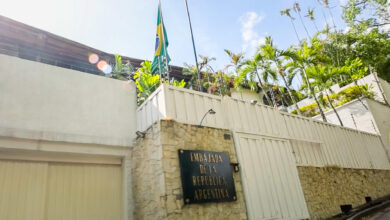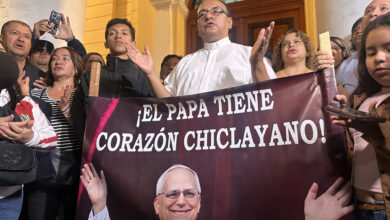Citgo’s legal issues continue to affect Venezuelan government
Listen to this article
Citgo is considered the most valuable foreign asset of Venezuela and it is now in a legal dispute between Maduro and Guaidó in USA's courts

In the middle of Houston's Energy Corridor, in the United States, there are the headquarters of Citgo, one of the largest refineries and fuel distributors in that country. The company, which belongs mostly to the Venezuelan state, has an uncertain future because a US court will decide whether its board of directors will be proposed by the current president Nicolás Maduro, or proposed by the opposition leader Juan Guaidó.
Leer en español: Los líos legales de Citgo continúan afectando al gobierno venezolano
This is the latest situation in a series of legal disputes in which Citgo has been meddled. This company has captured the attention of the Venezuelan government for years, and even more recently because of Guiado's permanence. Then, the question is: why is it so important to have Citgo's control?
Venezuela's valuable acquisition
Citgo was founded, under the name of Cities Service, in 1910 in the city of Bartlesville in the State of Oklahoma. It became a Venezuelan property in 1986, when the state oil company of this country, PDVSA, acquired 50% while Citgo was facing financial difficulties. By 1990, PDVSA had already acquired all the company and was leading it to be the eighth largest refinery in the United States.
Controlling Citgo allowed Venezuela to market the derivatives of its main export product, oil, directly to the final consumer. PDVSA recieved all the economic returns of each part of the oil value chain, profiting through the entire process, from extraction, through refining, to the sale of gasoline or the final petrochemical.
In addition, by having its operations in the United States, Citgo's profits weren't subject to the unstable exchange rate of Venezuelan Bolivar nor the precarious economic situation in Venezuela, which allowed the government to record constant revenues in dollars.
During that time, it became an important financial anchor for Hugo Chávez and Nicolás Maduro's governments, which, according to PDVSA's Commissary Report, received $12,250 million dollars in dividends from Citgo between 1998 and 2017. Only during Maduro's government, without 2018's figures, Citgo paid $3,793 million dollars in dividends to its owners.
According to the company's website, Citgo has three refineries in the United States: Corpus Christi, Texas; Lake Charles, Louisiana; and Lemont, Illinois. In addition, it has three pipelines of its own, plus six shared pipelines, and 48 supply terminals scattered throughout the eastern United States. All this comes together to form an important oil infrastructure network capable of competing with any other company in the industry.
A problematic acquisition
The great importance that Citgo has acquired in the last decades is the reason why at this moment they choose to defend their property in all courts. While the company gives millionaire dividends and has an enviable presence in the US oil industry, it has also been a source of headaches for the regime during the last years.
In 2010, the then president of Venezuela, Hugo Chávez, was determined to sell Citgo. "It's a bad business, we haven't been able to get rid of it", he said on that occasion. Facing the 2012 elections, Chávez thought about financing new social programs by selling Citgo, which he valued at $10,000 million dollars.
At that time, Chávez did not find a buyer, but his successor tried to get rid of the company once again in 2017, this time by selling it to the Russians. Because of its debts to China and Russia, the Venezuelan government was desperate for liquidity. If they sold 50% of Citgo to the Russian state oil company, Rosneft, Venezuela could have stopped the growing debt. Nevertheless, this deal was considered a threat to national security by many US politicians.
Likewise, the Venezuelan government has committed 49.9% of Citgo to Rosneft, since it was included as a collateral term for a loan from Russia that amounts to over $1,500 million dollars.
Without being able to make a favorable sale of the company, the Venezuelan government retained Citgo, until a series of legal lawsuits put it back in the balance.
In November 2017, Nicolás Maduro's government arrested six Citgo executives, many of them naturalized citizens of the United States, accused of embezzlement, money laundering, and conspiracy against the government. The six employees remain in jail until this year, in which they will finally face a trial that will determine their guilt.
In February, a lawsuit was filed against the company by a former employee named Marisol Gómez, who accused them of an unjustified dismissal after refusing to commit fraud and theft at the request of their bosses.
That same month, Citgo was sued by US glass manufacturer Owens-Illinois Inc., which was seeking a compensation of $500 million dollars after the nationalization of its subsidiaries in Venezuela. In the lawsuit, Owens-Illinois argues that it is "an alter ego, merely an instrumentality of Venezuela itself."
Read also: Lee C. Bucheit: the leader of the economic recovery in Juan Guaidó's Venezuela
All this comes without even mentioning the huge legal battle in which the company is struggling right now. President Maduro filed a lawsuit in a Houston court to recognize five people who applied for the director's board, meaning giving back Citgo's control to Venezuela's government, which is now under the administration of an ad-hoc board with Guaidó's people.
LatinAmerican Post | Pedro Bernal
Translated from "Los líos legales de Citgo continúan afectando al gobierno venezolano"





